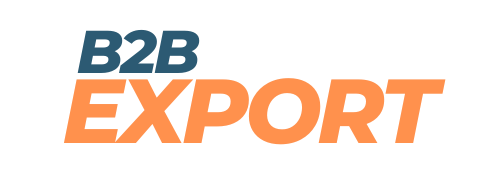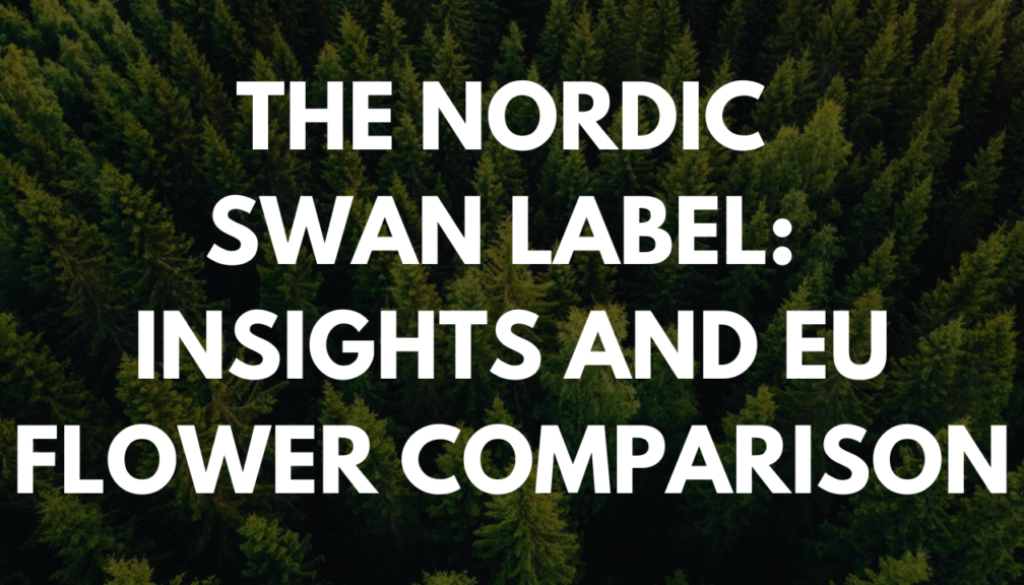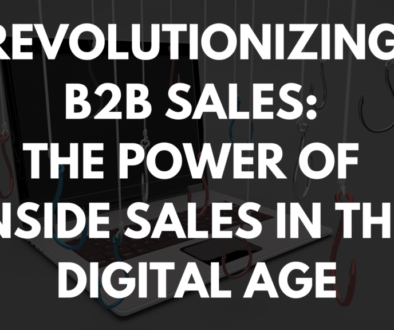The Nordic Swan Label: Insights and EU Flower Comparison
Last Updated on 4. Dec 2024 by b2bexport
The Nordic Swan Label, established in 1989 by the Nordic Council of Ministers, is a prominent eco label that guides consumers toward environmentally responsible and eco-certified choices.
Known for its stringent standards, the label certifies products that meet high environmental criteria throughout their life cycle, significantly contributing to sustainable development and promoting sustainable practices.
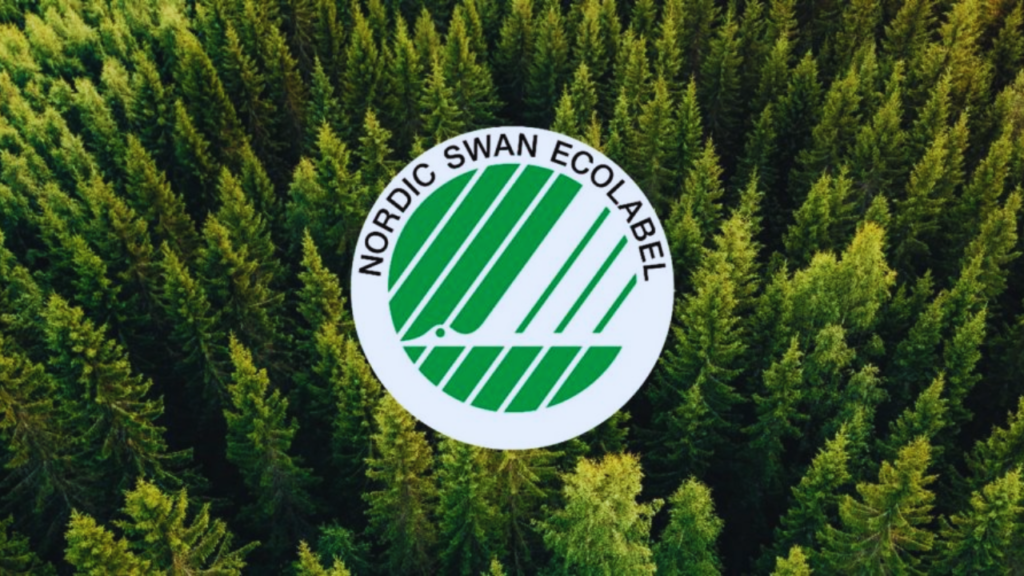
Understanding the Nordic Swan Label
Environmental consciousness significantly influences consumer decisions, and among the various eco labels, the Nordic Swan Label stands out as a symbol of environmental quality and sustainability.
The label guides consumers toward environmentally responsible choices by certifying products that meet stringent environmental standards, focusing on reducing environmental impact. This involves the entire life cycle of a product, from raw materials to the manufacturing process, ensuring minimal environmental impact and a positive impact on the natural environment.
The Certification Process and Its Implications
The certification process of the Nordic Swan Label is rigorous, ensuring that products are environmentally responsible.
This includes careful monitoring of environmental impacts, such as the carbon footprint and greenhouse gas emissions. Producers must comply with strict criteria, demonstrating their commitment to sustainability through the use of renewable resources and environmentally friendly practices.
Scientific studies often support the criteria to ensure credibility and effectiveness.
Benefits for Producers
Producers benefit from the Nordic Swan Label by enhancing their environmental performance and gaining consumer trust.
Certified products are seen as more reliable and environmentally responsible, which can lead to increased market share. Additionally, participating in such eco certification programs can lead to better compliance with international standards and environmental stewardship.
This certification also supports the company’s sustainability initiatives and can contribute to the overall positive impact on climate change and the community.
The Role of the EU Flower Eco Label
Both the Nordic Swan and EU Flower labels also play a role in certifying organic products, ensuring quality and authenticity in the organic market.
These labels promote eco-friendly practices and sustainable development across various industries, including food, cosmetics, and manufacturing.
Comparison with the EU Flower Eco Label
While the Nordic Swan Label is focused on the Nordic countries, the EU Flower eco certification has a broader scope, covering the entire European Union.
Both labels share common goals of reducing environmental impacts and promoting sustainable practices. However, the EU Flower label has its criteria and certification process, which is also rigorous and based on scientific studies to ensure environmental performance.
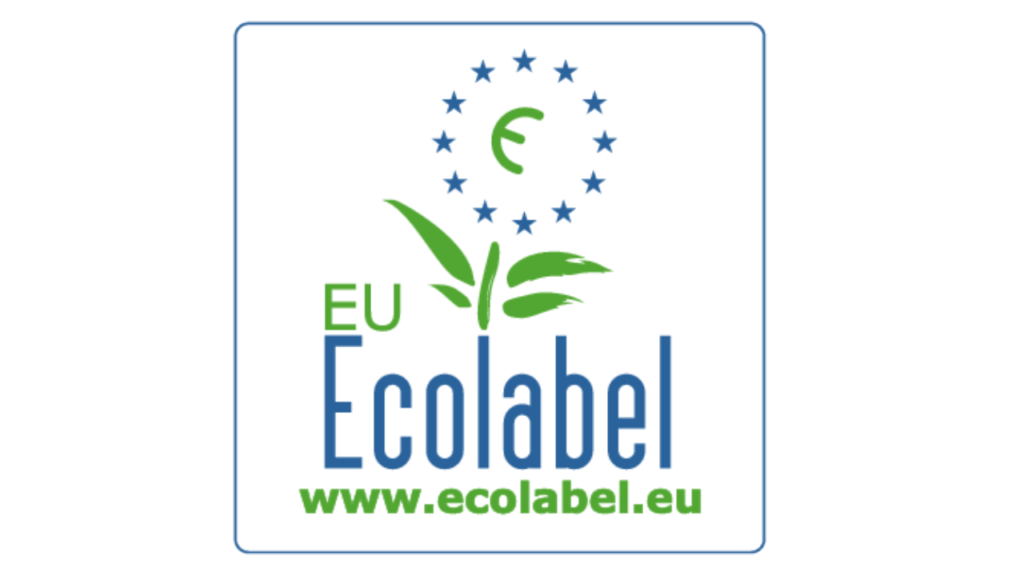
Application Process: Can Producers from Outside the Nordics Apply?
Producers from outside the Nordic countries can apply for the Nordic Swan Label, provided they meet the stringent environmental criteria.
This inclusive approach allows a broader range of companies to demonstrate their commitment to environmental stewardship and sustainability. The Nordic Swan Label and the EU Flower eco label are crucial in guiding consumers toward environmentally responsible choices. They certify products that meet high standards of environmental performance, contributing to sustainable development and the fight against climate change.
By understanding these labels and their benefits, consumers and producers can make more informed decisions that support a healthier planet and the company’s sustainability initiatives.
Background of the Nordic Swan Label
The Nordic Swan ecolabel certifies products based on their environmental impact throughout their life cycle, from raw material extraction to production, usage, and disposal.
It evaluates criteria such as resource efficiency, climate impact, chemical use, and overall sustainability. The label’s rigorous criteria reflect a strong commitment to environmental stewardship.
Recognized widely across the Nordic countries (Denmark, Finland, Norway, and Sweden), the label is trusted for its stringent standards and has earned consumer credibility.
Can Producers Outside the Nordics Apply?
Yes, producers from outside the Nordic countries can apply for the Nordic Swan label.
The label is open to international applicants who can meet the stringent environmental criteria and implement effective environmental management systems set forth by the Nordic Ecolabelling board. This inclusivity aims to promote global sustainability practices and encourage producers worldwide to improve their environmental performance (Nordic Swan Ecolabel) (Nordic Swan Ecolabel).
This inclusivity aligns with the broader goals of sustainable development, encouraging global producers to adopt environmentally friendly practices.
Application Process
The certification process for the Nordic Swan eco label involves several steps:
Identify Criteria: Producers need to determine if there are specific criteria for their product category.
The criteria documents outline the environmental requirements that must be met. These requirements are based on comprehensive scientific studies and international standards to ensure the highest level of environmental protection.
Prepare Documentation: Applicants must provide comprehensive documentation to demonstrate compliance with the criteria.
This includes detailed information on raw materials, production processes, and environmental management systems. The documentation should also address the product’s carbon footprint and any measures taken to mitigate greenhouse gas emissions.
Submit Application: Applications are submitted through the Nordic Ecolabelling Portal.
This online system facilitates the submission and review of applications, ensuring a streamlined process. The portal also provides guidance on the certification process and helps applicants understand the criteria they need to meet.
Evaluation and Certification: The submitted information is rigorously evaluated by Nordic Ecolabelling.
If the product meets all the necessary criteria, it is awarded the Nordic Swan ecolabel. This certification demonstrates the product’s commitment to sustainability and its positive impact on the environment.
Key Benefits and Impact
The Nordic Swan label offers numerous benefits to both producers and consumers.
For producers, obtaining this eco certification can enhance brand reputation, increase market access, and demonstrate a commitment to environmental stewardship. For consumers, the label provides assurance that the products they purchase are environmentally responsible and have been carefully monitored for compliance with strict environmental standards.
The Nordic Swan label covers a wide range of products, including food, natural cosmetics, and certified organic products.
It also extends to various industries such as manufacturing, aquaculture, and organic farming. By certifying products across different sectors, the label promotes sustainable development and helps reduce the environmental impacts of production and consumption.
Moreover, the Nordic Swan label supports initiatives such as integrated pest management, renewable resources, and the use of environmentally friendly raw materials.
These practices not only protect the natural environment but also contribute to the overall sustainability of the production process. The Nordic Swan label is a powerful tool for promoting environmental sustainability and encouraging responsible production practices. By certifying products based on their environmental performance throughout their life cycle, the label helps reduce the negative impacts of production and consumption on the environment.
Producers from around the world can apply for the Nordic Swan label, provided they meet the stringent criteria set by the Nordic Ecolabelling board.
This global inclusivity supports sustainable development and encourages producers to adopt eco-friendly practices. In conclusion, the Nordic Swan label plays a crucial role in driving positive environmental change and supporting the principles of sustainability.
By choosing products with this eco label, consumers can contribute to a healthier planet and support companies that prioritize environmental responsibility.
Environmental Performance Benefits for Producers: Enhancing Environmental Performance
Obtaining the Nordic Swan label offers several benefits to producers:
Market Differentiation:
The Swan label helps products stand out in the market by signaling high environmental performance and being eco certified.
Additionally, the label helps producers reduce their carbon footprint by promoting sustainable practices, ensuring that raw materials used are environmentally responsible.
Consumer Trust:
The Nordic Swan is a well-recognized and trusted ecolabel, enhancing brand reputation and consumer trust.
Consumers are increasingly looking for products that demonstrate commitment to sustainability and environmental stewardship
Regulatory Compliance:
Meeting the label’s criteria often means compliance with or exceeding local and international environmental regulations.
This compliance is crucial for companies aiming to certify organic products and improve their environmental performance.
The EU Flower Ecolabel
The EU Flower, or EU Ecolabel, is an eco certification introduced by the European Union in 1992 and serves a similar purpose as the Nordic Swan.
It aims to promote products and services that meet high environmental standards across Europe. The EU Flower covers a wide range of products, including household goods, appliances, and services, ensuring they adhere to sustainability principles.
EU Flower Life Cycle Comparison with the Nordic Swan
Both the Nordic Swan and the EU Flower are Type 1 ecolabels, which means they are based on life-cycle assessments and are independently verified according to the ISO 14024 standard.
These certifications provide environmental product declarations to offer comprehensive environmental data to consumers. However, there are some differences in their geographical focus and specific criteria, reflecting regional environmental priorities and consumer expectations.
Both labels emphasize integrated pest management, sustainable development, and the use of renewable resources.
Global Implications of Eco Labels
The ability of international producers to apply for the Nordic Swan label highlights the label’s role in promoting global sustainability.
By setting high environmental standards, the Nordic Swan and the EU Flower encourage producers worldwide to adopt more sustainable practices, contributing to global environmental goals such as reducing greenhouse gas emissions and minimizing the overall environmental impact. These eco certifications support the international standards for environmental stewardship and encourage the careful monitoring of production processes. They play a pivotal role in combating climate change and promoting environmentally responsible practices across various industries, including manufacturing, organic farming, and natural cosmetics.
In addition, labels like the Aquaculture Stewardship Council promote sustainable seafood farming practices, ensuring food safety and the protection of the natural environment.
These initiatives demonstrate a positive impact on the environment and help achieve sustainability goals.
Eco labels such as the Nordic Swan and the EU Flower are essential tools for promoting sustainability and environmental responsibility among producers. By adhering to these certifications, companies can improve their market position, build consumer trust, and ensure compliance with rigorous environmental standards.
The adoption of these labels supports global efforts to mitigate climate change and encourages sustainable development practices, benefiting not only individual companies but the world at large.
Swan-Labelled Clothing
The Swan label is an eco certification that is still emerging in the clothing industry.
Unlike more established labels, the Swan label is not yet widely adopted. When choosing between the Swan label and the EU Flower, the target market often influences the decision. For instance, Scandinavian consumers tend to favor the Swan label due to its strong alignment with sustainable development goals and commitment to sustainable fashion.
Eco-Labeled Textiles and Fast Fashion
The fast fashion industry’s emphasis on speed and low cost often conflicts with the time-consuming and expensive process of obtaining environmental certifications.
However, there is a growing market for eco-labeled clothing. The Nordic Ecolabel’s stringent chemical standards ensure textiles are free from harmful substances, promoting sustainable practices throughout the manufacturing process. While it does not guarantee 100% organic cotton, the label encourages environmentally responsible choices.
For instance, the ECOVERO™ variant of viscose, produced from sustainable wood fibers under strict environmental conditions, has recently earned the EU Flower.
Unlike regular viscose, ECOVERO™ involves a more environmentally friendly production process, demonstrating a positive impact on the natural environment. Brands like Esmé Studios have embraced such materials, showcasing their commitment to sustainable fashion and certified products.
This commitment aligns with broader goals of reducing the carbon footprint and improving environmental performance.

Criticism and Social Responsibility
Despite its focus on environmental sustainability, the Swan label has faced criticism for not addressing broader social issues such as poverty and inequality.
While the label improves working conditions by reducing harmful chemical exposure, it does not explicitly target social goals. For a more comprehensive approach, consumers may look for certifications like SA8000, which ensures socially responsible working conditions. Another prominent certification, the Global Organic Textile Standard (GOTS), stands out as a leading standard in ecological and social criteria within the clothing industry. GOTS ensures sustainable practices throughout the production chain, from raw materials to final products.
The Swan label represents a step towards sustainability in the clothing industry, though it primarily focuses on environmental stewardship rather than social responsibility.
For consumers and companies looking to align with international standards and positive impact, exploring additional certifications and eco-labels can provide a more comprehensive view of sustainable practices and certified products.
Conclusion
The Nordic Swan ecolabel is a powerful tool for promoting sustainable development in consumer products.
Producers from outside the Nordic countries can apply for this prestigious eco certification, provided they meet its stringent criteria. The EU Flower ecolabel serves a similar purpose across Europe, guiding consumers towards environmentally responsible products. Both labels play a crucial role in enhancing environmental performance and promoting positive impact through environmental stewardship.
These certified products not only demonstrate commitment to sustainability but also align with international standards.
They support responsible practices in the manufacturing process, ensuring that raw materials are sourced from renewable resources and minimizing the carbon footprint. By adhering to environmental product declarations, these labels help companies manage their environmental impacts and achieve sustainable outcomes. The certification process for both labels involves careful monitoring and adherence to scientific studies to ensure compliance with environmental and social requirements.
The Nordic Swan and EU Flower labels are instrumental in promoting integrated pest management and certifying organic products, including natural cosmetics and organic farming.
They also support aquaculture stewardship council standards and food safety initiatives, protecting seafood and farm practices. As more manufacturers and retailers participate in these programs, they contribute to a global effort to protect the natural environment, reduce pollution, and mitigate climate change. Through their environmental impact and sustainable practices, these labels foster trust and transparency in the marketplace, benefiting consumers and the community alike.
These labels are instrumental in certifying organic products, ensuring they meet high environmental and quality standards.
FAQ: The Nordic Swan Eco Label: Insights and EU Flower Comparison
Q: What is the Nordic Swan label?
A: The Nordic Swan label is an eco-label established in 1989 by the Nordic Council of Ministers.
It certifies products that meet high environmental standards throughout their life cycle, from raw material extraction to disposal.
Q: Can producers from outside the Nordic countries apply for the Nordic Swan eco label?
A: Yes, producers from outside the Nordic countries can apply for the Nordic Swan label if they meet the stringent environmental criteria set by the Nordic Ecolabelling board.
Q: What are the steps to apply for the Nordic Swan label?
A: The steps include:
- Identify Criteria: Check if there are specific criteria for your product category.
- Prepare Documentation: Provide detailed information on raw materials, production processes, and environmental management.
- Submit Application: Use the Nordic Ecolabelling Portal to submit your application.
- Evaluation and Certification: Nordic Ecolabelling reviews the application, and if the product meets all criteria, it is awarded the Nordic Swan label.
Q: What benefits do producers gain from obtaining the Nordic Swan label?
A: Benefits include:
- Market Differentiation: Standing out in the market by signaling high environmental performance.
- Consumer Trust: Enhancing brand reputation and trust with the well-recognized label.
- Regulatory Compliance: Often meeting or exceeding local and international environmental regulations.
Q: What is the EU Flower ecolabel?
A: The EU Flower, or EU Ecolabel, introduced by the European Union in 1992, certifies products and services that meet high environmental standards across Europe, similar to the Nordic Swan.
Q: How do the Nordic Swan and EU Flower labels compare?
A: Both labels are Type 1 ecolabels based on life-cycle assessments and independently verified according to the ISO 14024 standard.
They provide environmental product declarations but have different geographical focuses and criteria reflecting regional priorities.
Q: Why are eco-labels like the Nordic Swan and EU Flower important globally?
A: These labels promote global sustainability by encouraging producers worldwide to adopt more sustainable practices, helping to reduce greenhouse gas emissions and protect the environment.
Q: What is the impact of the Nordic Swan label on consumer behavior?
A: The Nordic Swan label influences consumers to make environmentally responsible choices by certifying products that meet high environmental standards, thereby building trust and promoting sustainability.
Q: How does the Nordic Swan label benefit the environment?
A: By setting high environmental standards, the label helps reduce the environmental impact of products throughout their life cycle, promoting resource efficiency, reducing chemical use, and minimizing climate impact.
